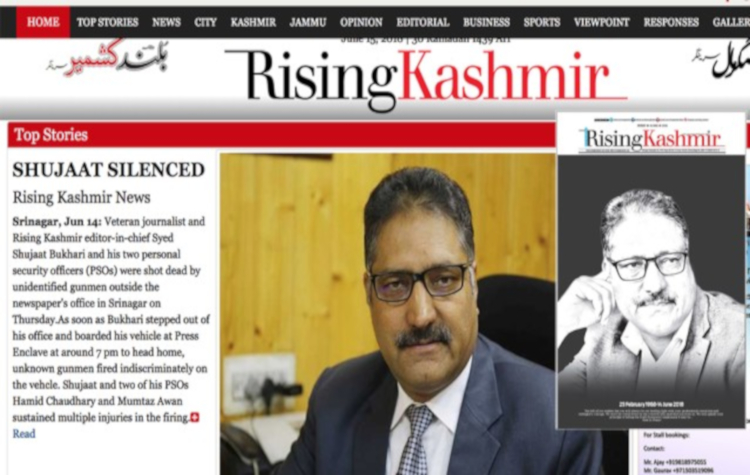(Kathmandu/Bangkok, 20 June 2018) – The Asian Forum for Human Rights and Development (FORUM-ASIA) is deeply anguished over the murder of Shujaat Bukhari, editor of the newspaper ‘Rising Kashmir‘, on 14 June outside his office in Central Srinagar. He, along with two of his bodyguards, was shot dead by unknown gunmen.
Bukhari was a prominent journalist and literary and cultural activist in Kashmir, with a career spanning over three decades. Being a well-known advocate for peace in Kashmir, he was constantly involved in events both in India and abroad to resolve the armed conflict in Kashmir. According to police reports, he was shot at close range. Police claim they have arrested one suspect and are looking into three others.
While his killing has officially been called an act of terrorism by the Government of India, the murder of such an outspoken journalist points to a decline of rule of law in Kashmir and a pattern of growing intolerance towards voices of dissent. Coincidentally, his murder took place hours after the United Nations Office of the High Commissioner for Human Rights published its first ever 49-page report on Kashmir, highlighting human rights violations and a chronic culture of impunity enjoyed by the security forces over decades in Kashmir.
Due to his work, Bukhari was abducted in 1995 by militants. In 2006, an unknown gunman tried to shoot him, but he managed to escape. Following these incidents, in 2006, he was provided with police protection by the Government.
Soon after his death, several journalists reported that Bukhari was anxious of being murdered as he continued his journalistic work and efforts to peacefully resolve the Kashmir conflict, because of the multiple attempts on his life. As a journalist, Bukhari believed in covering the crisis in Kashmir in-depth and impartially. He often criticised the actions of the Indian Army in Kashmir, and denounced the militant-led violence. His newspaper ‘Rising Kashmir’ has served as a prominent and credible source of information on the Kashmir conflict since 2008.
The case of Shujaat Bukhari is not alone in Kashmir. Journalists in Kashmir constantly face repression, violence, and threats to their lives for doing their professional duties in a conflict zone, and for exercising their right to freedom of opinion and expression. On 15 May 2018, photojournalist Masrat Zahra[1] was intimidated and harassed for covering an operation by armed security personnel in the same state. Several other Indian journalists and women reporters in particular, over the year, have increasingly reported acts of intimidation against them in Kashmir.[2]
Bukhari’s assassination is an indication of an increasing trend of the shrinking democratic space, rising intolerance towards different views and derogation of the rule of law in India. According to the 2018 World Press Freedom Index, India has slipped from 136 in 2017 to 138 in 2018.
The broad day light murder in a relatively secure zone indicates the level of extreme vulnerability of journalists in Kashmir.
FORUM-ASIA urges the Government of India and the Government of Jammu and Kashmir to:
- Immediately conduct a credible investigation to bring the perpetrators to justice.
- Take proactive action to protect journalists from the growing threats they face.
- Enact enabling laws and policies protecting journalists and human rights defenders, and
- Ensure freedom of opinion and expression throughout the country.
***
For a PDF version of this statement, please click here.
For further information, please contact
– South Asia Programme, FORUM-ASIA, [email protected]
[1] https://forum-asia.org/?p=26390
[2] https://www.shethepeople.tv/news/women-journalists-kashmir-conflict/



